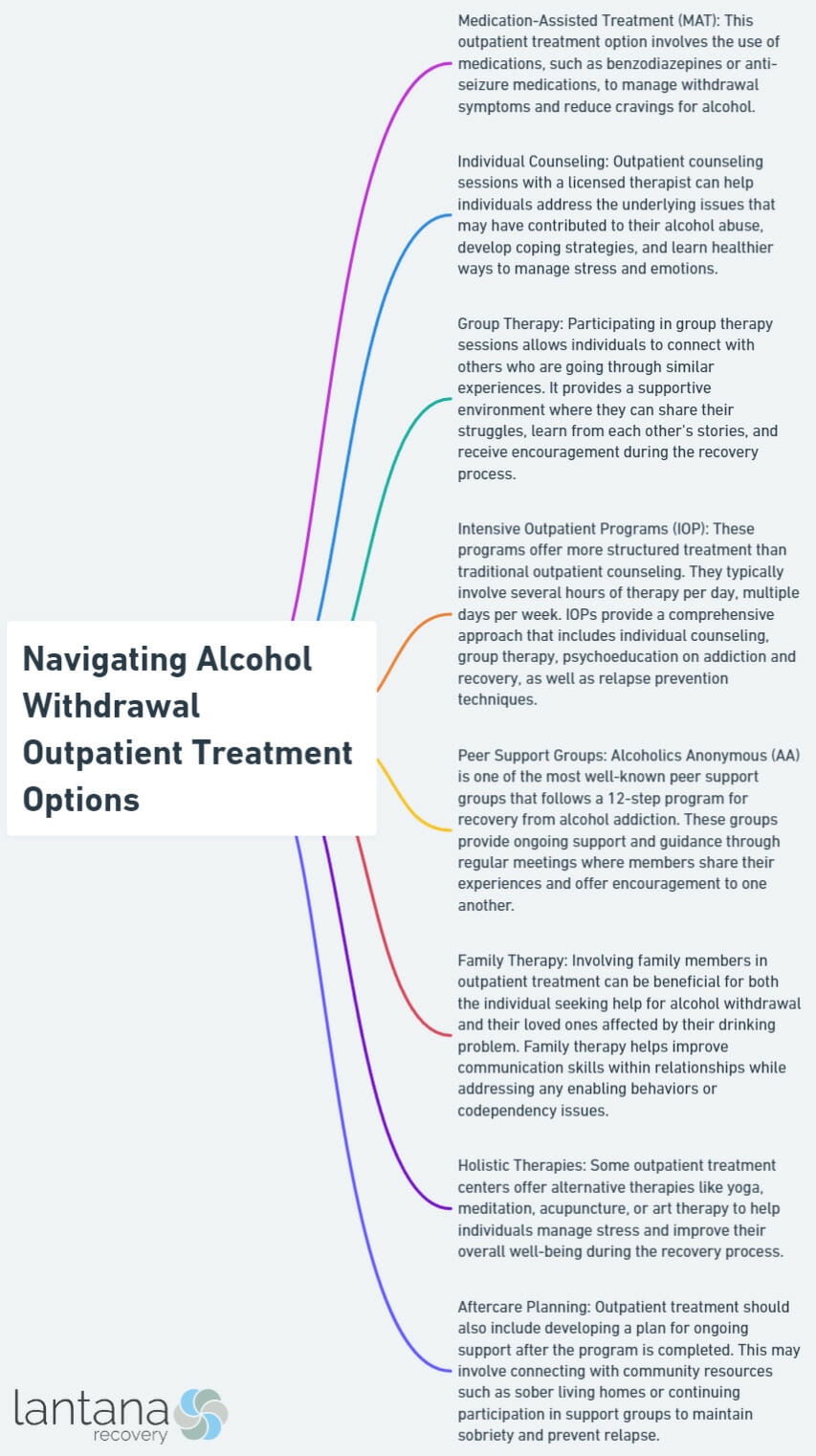Embarking on the journey to overcome alcohol dependence is a significant and courageous step. Navigating through the various treatment options can be overwhelming, but fear not. This comprehensive guide will help you understand alcohol withdrawal outpatient, compare outpatient and inpatient treatment options, and provide insights on how to select the most suitable program for your unique needs. Let’s dive in and explore the world of alcohol withdrawal treatment options together.
Key Takeaways
- Understanding Alcohol Withdrawal involves recognizing the stages of severity and utilizing pharmacotherapy to manage symptoms.
- Outpatient or Inpatient treatment for alcohol withdrawal should be evaluated based on individual needs, risk factors and severity of symptoms.
- Professional guidance can provide an informed decision when determining an appropriate alcohol withdrawal treatment option.
Understanding Alcohol Withdrawal

Alcohol Withdrawal Syndrome (AWS) is a condition that can occur when individuals who have been consuming alcohol heavily over an extended period of time, potentially leading to alcohol abuse, significantly reduce their alcohol intake or cease it abruptly. It is composed of three or four stages of severity, which are classified according to the symptoms a patient is exhibiting.
Pharmacotherapy plays a significant role in managing AWS symptoms and halting the progression to severe withdrawals, thereby facilitating long-term recovery.
Mild to Moderate Symptoms
Nausea, vomiting, auditory disturbances, headache, tactile disturbances, paroxysmal sweats, agitation, tremor, visual disturbances, orientation and clouding of sensorium, and hiccups in alcohol withdrawal are considered mild symptoms. If left untreated, these symptoms can significantly disrupt an individual’s wellbeing and escalate to severe alcohol withdrawal symptoms, potentially leading to life-threatening conditions.
The kindling concept suggests that recurrent withdrawal episodes can accelerate the onset and exacerbate the severity of symptoms in patients with alcohol use disorder. This is often due to reduced GABA levels in substance abuse cases like alcohol withdrawal, causing an overactivity in the nervous system.
Severe Symptoms
Stage 3 of alcohol withdrawal treatment is characterized by an increase in the severity of symptoms and the addition of seizures. Severe consequences of alcohol withdrawal, including alcohol withdrawal seizures or delirium symptoms (DTs), are observed in 5% of individuals with alcohol dependency. ( Core Psychiatry (Third Edition), 2012)
The mortality rate for individuals experiencing Delirium tumors (DTs) can be anywhere from 1% to 15%. This is quite a wide range, highlighting the potential seriousness of the situation.
DTs produce a wide range of symptoms, such as:
- Diaphoresis
- Fever
- Nightmares
- Agitation
- Global confusion
- Disorientation
- Visual and auditory hallucinations
Additionally, there can be cardiovascular and metabolic complications.
Inpatient detox is necessary when alcohol withdrawal symptoms are severe, as this can lead to delirium, a potentially fatal condition.
Outpatient Treatment for Alcohol Withdrawal

Outpatient treatment is an option for managing alcohol withdrawal symptoms, providing individuals the opportunity to receive help during the day while returning home at night.
Outpatient treatment is better suited for individuals with mild to moderate symptoms, a strong support system, a safe home environment, and non-deferrable responsibilities.
Advantages of Outpatient Treatment
Outpatient detox is a cost-effective, accessible solution that allows individuals to maintain their regular daily activities. Despite its affordability and time efficiency, an outpatient detox program still delivers results equivalent to inpatient detoxification.
“Outpatient detoxification, at least in a highly structured frame, can be considered as a safe and efficient therapeutic approach,” claims a clinical study published in European Addiction Research. (Outpatient Alcohol Detoxification: Implementation Efficacy and Outcome Effectiveness of a Model Project, Soyka, Horak, 2004)
The main appeal of outpatient detox includes:
- Balancing treatment with work or family commitments
- Continuing with daily activities
- Sustaining job and family relationships
- Managing lower treatment expenses
- Enjoying more autonomy with minimal disruption.
Disadvantages of Outpatient Treatment
Outpatient alcohol treatment may increase the risk of relapse due to the lack of a controlled environment and potential access to alcohol. Individuals who have been heavy drinkers for extended periods of time may not be suitable for outpatient alcohol detox due to the potential for extreme withdrawal symptoms such as seizures and depression, which can be fatal if not managed in a medical setting.
Research has also indicated that:
- Those in outpatient detox programs are more susceptible to triggers that can lead to opioid use
- Outpatient opioid detox programs have been associated with higher relapse rates
- Patients may not adhere to their detoxification schedules in outpatient programs.
Inpatient Treatment for Alcohol Withdrawal

As an alternative to outpatient care, inpatient treatment offers a more intensive approach to managing alcohol withdrawal symptoms. Inpatient alcohol detox takes place within an addiction treatment facility where medical professionals closely monitor for any dangerous symptoms and may administer medications to make the withdrawal process safer and more tolerable.
Advantages of Inpatient Treatment
Inpatient treatment offers medical supervision, access to medications to facilitate a safe and manageable withdrawal process, and a supportive environment.
Inpatient alcohol detox is a fitting choice for individuals with:
- a lengthy drinking history
- a high likelihood of severe alcohol withdrawal symptoms
- those who may struggle with home environment temptations to successfully complete detox independently.
Disadvantages of Inpatient Treatment
Inpatient treatment can be costly and necessitates individuals to relocate from their homes and employment, which can be disruptive to their regular routines and obligations. Inpatient treatment also involves living in a shared setting with other individuals who are also undergoing withdrawal, which can lead to a loss of privacy and personal space.
Additionally, inpatient treatment usually follows a structured schedule, leaving little allowance for personal preferences or adaptability in treatment options. Some individuals may also experience:
- Stigmatization or judgment for seeking inpatient treatment for alcohol withdrawal
- Limited access to family and social support networks
- Higher costs compared to outpatient treatment options
Comparing Outpatient and Inpatient Treatment Outcomes

While both outpatient and inpatient treatment options have their own set of benefits and drawbacks, it is important to note that the choice of an inpatient or outpatient setting for detoxification does not seem to have an effect on the overall treatment outcome.
The most effective way to decide between outpatient and inpatient treatment is to evaluate one’s individual requirements and potential risks, receive professional advice, and contemplate the pros and cons of both options.
Factors Influencing Treatment Outcome
Withdrawal symptoms can vary from mild to severe, influenced by the individual’s level of alcohol dependence. Factors such as:
- age
- gender
- mental health
- physical health
Various factors, including drug and alcohol withdrawal, also contribute to the treatment outcome for alcohol withdrawal.
Social support plays a critical role in the outcome of treatment for alcohol withdrawal, as having a strong support system of family and friends can help an individual remain committed and motivated throughout their recovery journey. Patients with more severe psychiatric issues or limited social support are expected to benefit more from being treated as inpatients, even though it can be costly, recommends a research published in Psychiatry Quarterly comparing the efficacy of inpatient and outpatient addiction treatment programs.
Treatment approach and follow-up care are essential components in the outcome of treatment for alcohol withdrawal, with a comprehensive treatment plan encompassing medication, counseling, and lifestyle modifications assisting an individual in attaining long-term sobriety.
Essential Components of an Effective Alcohol Withdrawal Treatment Program

An effective alcohol withdrawal treatment program, whether outpatient or inpatient, should encompass a comprehensive evaluation, stabilization, and a plan for long-term sobriety. The evaluation step of an alcohol detoxification program involves a physical examination, questioning process, and a blood alcohol content test administered by medical personnel.
Achieving stabilization is the key to success in a detox program. An assessment, stabilization, and preparation for treatment are the three primary components of a detox program. Treatment programs can be conducted in a variety of ways. Inpatient or outpatient settings, or through teletherapy, are common approaches.
Finding the Right Alcohol Withdrawal Treatment Option

Choosing a suitable treatment of alcohol withdrawal option is crucial as it helps alleviate withdrawal symptom intensity and prevent potential complications.
When determining the most suitable treatment option, it is important to consider one’s individual needs, risk factors, and the severity of withdrawal symptoms.
Assessing Personal Needs and Risk Factors

Personal needs and risk factors should be considered when choosing a treatment option for alcohol withdrawal, as they can help identify the most appropriate approach. The duration and magnitude of the symptoms, as well as any other existing medical conditions, should be considered when evaluating the seriousness of alcohol withdrawal symptoms.
It is essential to consider any existing medical conditions when selecting a treatment option for alcohol withdrawal, as these conditions can influence the intensity of the withdrawal symptoms and the most suitable treatment option for you.
Seeking Professional Guidance

It can be beneficial to consult with a healthcare provider or addiction specialist when choosing an alcohol withdrawal treatment option. They can assess individual needs, provide information about various treatment options, and aid in making an informed decision.
Healthcare providers and addiction specialists can provide assistance when determining a treatment option for alcohol withdrawal. The advantages of consulting a professional when selecting a treatment option for alcohol withdrawal include evaluating one’s individual needs, obtaining information regarding various treatment options, and making a knowledgeable decision. For more information, read our article on one of the most common and initial symptoms i.e. chills during alcohol withdrawal.
Locating Outpatient Alcohol Withdrawal Treatment Centers
To find an outpatient alcohol withdrawal treatment center, consider contacting SAMHSA’s National Helpline or visiting websites like Withdrawal.net, American Addiction Centers, or The Recovery Village. It’s crucial to assess the type of treatment offered, staff qualifications, treatment cost, and the center’s location when choosing an outpatient center. Also, verify the center’s accreditation and its reputation.
Outpatient treatment for alcohol withdrawal presents the advantage of allowing the patient to remain in their home environment while receiving treatment. This can prove beneficial for individuals with family or work obligations that cannot be put on hold.

Summary
In conclusion, the journey to overcome alcohol dependence is a challenging yet rewarding one. Understanding the different treatment options for alcohol withdrawal, their advantages and disadvantages, and seeking professional guidance can help you make an informed decision. Whether you choose outpatient or inpatient treatment, the key to success lies in your commitment to recovery and the support of your loved ones. Take the first step towards a brighter future free from the shackles of alcohol dependence.
Frequently Asked Questions
What are the 4 treatments for alcoholism?
Treatment for alcoholism includes psychological counseling, medications, social support, and lifestyle changes.
These four approaches can work together to help individuals overcome alcohol misuse and gain sobriety.
What is the first line of treatment for alcoholism?
The first line of treatment for alcoholism is typically detoxification under professional medical care, followed by naltrexone to aid in the recovery process.
This approach helps reduce cravings and withdrawal symptoms and provides a safe and effective way to manage alcohol use disorder.
What are the main differences between outpatient and inpatient treatment for alcohol withdrawal?
Outpatient treatment offers more flexibility and cost-efficiency while allowing individuals to remain in their home environment, whereas inpatient treatment provides a higher level of care and 24-hour medical supervision at a potentially greater cost.
How can I determine which treatment option is best for me?
Consult with your healthcare team to decide what treatment option is best for you based on your personal needs, risk factors, and severity of withdrawal symptoms.
Consider the potential side effects of each option and how they may affect your daily life.
Discuss any concerns you have with your healthcare team and ask questions to ensure you understand the risks and benefits of each option.
Make sure to follow the instructions.
What are the essential components of an effective alcohol withdrawal treatment program?
An effective alcohol withdrawal treatment program should include thorough evaluation, stabilization, and planning for long-term sobriety to ensure success.
This program should include a comprehensive assessment of the individual’s physical and mental health, as well as their social and environmental factors. The assessment should be used to create a personalized treatment plan that addresses the individual’s specific needs.








